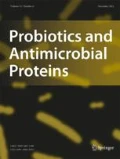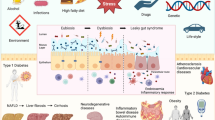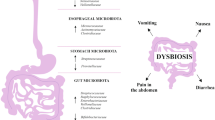Abstract
The use of in vitro systems that allow efficient selection of probiotic candidates with immunomodulatory properties could significantly minimize the use of experimental animals. In this work, we generated an in vitro immunoassay system based on porcine intestinal epithelial (PIE) cells and dextran sodium sulfate (DSS) administration that could be useful for the selection and characterization of potential probiotic strains to be used in inflammatory bowel disease (IBD) patients. Our strategy was based on two fundamental pillars: on the one hand, the capacity of PIE cells to create a monolayer by attaching to neighboring cells and efficiently mount inflammatory responses and, on the other hand, the use of two probiotic bifidobacteria strains that have been characterized in terms of their immunomodulatory capacities, particularly in mouse IBD models and patients. Our results demonstrated that DSS administration can alter the epithelial barrier created in vitro by PIE cells and induce a potent inflammatory response, characterized by increases in the expression levels of several inflammatory factors including TNF-α, IL-1α, CCL4, CCL8, CCL11, CXCL5, CXCL9, CXCL10, SELL, SELE, EPCAM, VCAM, NCF2, and SAA2. In addition, we demonstrated that Bifidobacterium breve M-16V and B. longum BB536 are able to regulate the C-jun N-terminal kinase (JNK) intracellular signalling pathway, reducing the DSS-induced alterations of the in vitro epithelial barrier and differentially regulating the inflammatory response in a strain-dependent fashion. The good correlation between our in vitro findings in PIE cells and previous studies in animal models and IBD patients shows the potential value of our system to select new probiotic candidates in an efficient way.






Similar content being viewed by others
References
Xavier RJ, Podolsky DK (2007) Unravelling the pathogenesis of inflammatory bowel disease. Nature 448:427–434. https://doi.org/10.1038/nature06005
Braus NA, Elliott DE (2009) Advances in the pathogenesis and treatment of IBD. Clin Immunol 132:1–9. https://doi.org/10.1016/j.clim.2009.02.006
Uhlig HH (2013) Monogenic diseases associated with intestinal inflammation: implications for the understanding of inflammatory bowel disease. Gut 62:1795–1805. https://doi.org/10.1136/gutjnl-2012-303956
Günther C, Neumann H, Neurath MF, Becker C (2013) Apoptosis, necrosis and necroptosis: cell death regulation in the intestinal epithelium. Gut 62:1062–1071. https://doi.org/10.1136/gutjnl-2011-301364
Hagiwara C, Tanaka M, Kudo H (2002) Increase in colorectal epithelial apoptotic cells in patients with ulcerative colitis ultimately requiring surgery. J Gastroenterol Hepatol 17:758–764. https://doi.org/10.1046/j.1440-1746.2002.02791.x
Goretsky T, Dirisina R, Sinh P, Mittal N, Managlia E, Williams DB, Posca D, Ryu H, Katzman RB, Barrett TA (2012) P53 mediates TNF-induced epithelial cell apoptosis in IBD. Am J Pathol 181:1306–1315. https://doi.org/10.1016/j.ajpath.2012.06.016
Bouma G, Strober W (2003) The immunological and genetic basis of inflammatory bowel disease. Nat Rev Immunol 3:521–533. https://doi.org/10.1038/nri1132
Maloy KJ, Powrie F (2011) Intestinal homeostasis and its breakdown in inflammatory bowel disease. Nature 474:298–306. https://doi.org/10.1038/nature10208
Martín R, Chain F, Miquel S, Motta JP, Vergnolle N, Sokol H, Langella P (2017) Using murine colitis models to analyze probiotics-host interactions. FEMS Microbiol Rev 035:49–70. https://doi.org/10.1093/femsre/fux035
Ganji-Arjenaki M, Rafieian-Kopaei M (2018) Probiotics are a good choice in remission of inflammatory bowel diseases: a meta analysis and systematic review. J Cell Physiol 233:2091–2103. https://doi.org/10.1002/jcp.25911
Imaoka A, Shima T, Kato K, Mizuno S, Uehara T, Matsumoto S, Setoyama H, Hara T, Umesaki Y (2008) Anti-inflammatory activity of probiotic Bifidobacterium: enhancement of IL-10 production in peripheral blood mononuclear cells from ulcerative colitis patients and inhibition of IL-8 secretion in HT-29 cells. World J Gastroenterol 14:2511–2516. https://doi.org/10.3748/wjg.14.2511
Chae JM, Heo W, Cho HT, Lee DH, Kim JH, Rhee MS, Park TS, Kim YK, Lee JH, Kim YJ (2018) Effects of orally-administered Bifidobacterium animalis subsp. lactis strain BB12 on dextran sodium sulfate-induced colitis in mice. J Microbiol Biotechnol 28:1800–1805. https://doi.org/10.4014/jmb.1805.05072
Satish Kumar CSV, Kondal Reddy K, Boobalan G, Gopala Reddy A, Sudha Rani Chowdhary CH, Vinoth A, Jayakanth K, Srinivasa Rao G (2017) Immunomodulatory effects of Bifidobacterium bifidum 231 on trinitrobenzenesulfonic acid-induced ulcerative colitis in rats. Res Vet Sci 110:40–46. https://doi.org/10.1016/j.rvsc.2016.10.010
Martín R, Laval L, Chain F et al (2016) Bifidobacterium animalis ssp. lactis CNCM-I2494 restores gut barrier permeability in chronically low-grade inflamed mice. Front Microbiol 7:608. https://doi.org/10.3389/fmicb.2016.00608
Srutkova D, Schwarzer M, Hudcovic T, Zakostelska Z, Drab V, Spanova A, Rittich B, Kozakova H, Schabussova I (2015) Bifidobacterium longum CCM 7952 promotes epithelial barrier function and prevents acute dss-induced colitis in strictly strain-specific manner. PLoS One 10:e0134050. https://doi.org/10.1371/journal.pone.0134050
Kiesler P, Fuss IJ, Strober W (2015) Experimental models of inflammatory bowel diseases. Cell Mol Gastroenterol Hepatol 1:154–170. https://doi.org/10.1016/j.jcmgh.2015.01.006
Lamas B, Richard ML, Leducq V, Pham HP, Michel ML, da Costa G, Bridonneau C, Jegou S, Hoffmann TW, Natividad JM, Brot L, Taleb S, Couturier-Maillard A, Nion-Larmurier I, Merabtene F, Seksik P, Bourrier A, Cosnes J, Ryffel B, Beaugerie L, Launay JM, Langella P, Xavier RJ, Sokol H (2016) CARD9 impacts colitis by altering gut microbiota metabolism of tryptophan into aryl hydrocarbon receptor ligands. Nat Med 22:598–605. https://doi.org/10.1038/nm.4102
Khor B, Gardet A, Xavier RJ (2011) Genetics and pathogenesis of inflammatory bowel disease. Nature 474:307–317. https://doi.org/10.1038/nature10209
Sokol H, Leducq V, Aschard H, Pham HP, Jegou S, Landman C, Cohen D, Liguori G, Bourrier A, Nion-Larmurier I, Cosnes J, Seksik P, Langella P, Skurnik D, Richard ML, Beaugerie L (2017) Fungal microbiota dysbiosis in IBD. Gut 66:1039–1048. https://doi.org/10.1136/gutjnl-2015-310746
Stokes WS (2002) Humane endpoints for laboratory animals used in regulatory testing. ILAR J 43:S31–S38. https://doi.org/10.1093/ilar.43.suppl_1.s31
Moue M, Tohno M, Shimazu T, Kido T, Aso H, Saito T, Kitazawa H (2008) Toll-like receptor 4 and cytokine expression involved in functional immune response in an originally established porcine intestinal epitheliocyte cell line. Biochim Biophys Acta 1780:134–144. https://doi.org/10.1016/j.bbagen.2007.11.006
Hosoya S, Villena J, Shimazu T, Tohno M, Fujie H, Chiba E, Shimosato T, Aso H, Suda Y, Kawai Y, Saito T, Alvarez S, Ikegami S, Itoh H, Kitazawa H (2011) Immunobiotic lactic acid bacteria beneficially regulate immune response triggered by poly(I:C) in porcine intestinal epithelial cells. Vet Res 42:111. https://doi.org/10.1186/1297-9716-42-111
Shimazu T, Villena J, Tohno M, Fujie H, Hosoya S, Shimosato T, Aso H, Suda Y, Kawai Y, Saito T, Makino S, Ikegami S, Itoh H, Kitazawa H (2012) Immunobiotic Lactobacillus jensenii elicits anti-inflammatory activity in porcine intestinal epithelial cells by modulating negative regulators of the Toll-like receptor signaling pathway. Infect Immun 80:276–288. https://doi.org/10.1128/IAI.05729-11
Ishizuka T, Kanmani P, Kobayashi H, Miyazaki A, Soma J, Suda Y, Aso H, Nochi T, Iwabuchi N, Xiao JZ, Saito T, Villena J, Kitazawa H (2016) Immunobiotic bifidobacteria strains modulate rotavirus immune response in porcine intestinal epitheliocytes via pattern recognition receptor signaling. PLoS One 11:e0152416. https://doi.org/10.1371/journal.pone.0152416
Kobayashi H, Albarracin L, Sato N, Kanmani P, Kober AKMH, Ikeda-Ohtsubo W, Suda Y, Nochi T, Aso H, Makino S, Kano H, Ohkawara S, Saito T, Villena J, Kitazawa H (2016) Modulation of porcine intestinal epitheliocytes immunetranscriptome response by Lactobacillus jensenii TL2937. Benef Microbes 7:769–782. https://doi.org/10.3920/BM2016.0095
Albarracin L, Kobayashi H, Iida H, Sato N, Nochi T, Aso H, Salva S, Alvarez S, Kitazawa H, Villena J (2017) Transcriptomic analysis of the innate antiviral immune response in porcine intestinal epithelial cells: influence of immunobiotic lactobacilli. Front Immunol 8:57. https://doi.org/10.3389/fimmu.2017.00057
Albarracin L, García-Castillo V, Masumizu Y et al (2020) Efficient selection of new immunobiotic strains with antiviral effects in local and distal mucosal sites by using porcine intestinal epitheliocytes. Front Immunol 11:543. https://doi.org/10.3389/FIMMU.2020.00543
Izumi H, Minegishi M, Sato Y, Shimizu T, Sekine K, Takase M (2015) Bifidobacterium breve alters immune function and ameliorates DSS-induced inflammation in weanling rats. Pediatr Res 78:407–416. https://doi.org/10.1038/pr.2015.115
Furrie E, Macfarlane S, Kennedy A et al (2005) Synbiotic therapy (Bifidobacterium longum/synergy 1) initiates resolution of inflammation in patients with active ulcerative colitis: a randomised controlled pilot trial. Gut 54:242–249. https://doi.org/10.1136/gut.2004.044834
Tamaki H, Nakase H, Inoue S, Kawanami C, Itani T, Ohana M, Kusaka T, Uose S, Hisatsune H, Tojo M, Noda T, Arasawa S, Izuta M, Kubo A, Ogawa C, Matsunaka T, Shibatouge M (2016) Efficacy of probiotic treatment with Bifidobacterium longum 536 for induction of remission in active ulcerative colitis: a randomized, double-blinded, placebo-controlled multicenter trial. Dig Endosc 28:67–74. https://doi.org/10.1111/den.12553
Abe F, Muto M, Yaeshima T, Iwatsuki K, Aihara H, Ohashi Y, Fujisawa T (2010) Safety evaluation of probiotic bifidobacteria by analysis of mucin degradation activity and translocation ability. Anaerobe 16:131–136. https://doi.org/10.1016/j.anaerobe.2009.07.006
Murofushi Y, Villena J, Morie K, Kanmani P, Tohno M, Shimazu T, Aso H, Suda Y, Hashiguchi K, Saito T, Kitazawa H (2015) The toll-like receptor family protein RP105/MD1 complex is involved in the immunoregulatory effect of exopolysaccharides from Lactobacillus plantarum N14. Mol Immunol 64:63–75. https://doi.org/10.1016/j.molimm.2014.10.027
Patole S, Keil AD, Chang A, Nathan E, Doherty D, Simmer K, Esvaran M, Conway P (2014) Effect of Bifidobacterium breve M-16V supplementation on fecal bifidobacteria in preterm neonates - a randomised double blind placebo controlled trial. PLoS One 9:e89511. https://doi.org/10.1371/journal.pone.0089511
Ohtsuka Y, Ikegami T, Izumi H, Namura M, Ikeda T, Ikuse T, Baba Y, Kudo T, Suzuki R, Shimizu T (2012) Effects of Bifidobacterium breve on inflammatory gene expression in neonatal and weaning rat intestine. Pediatr Res 71:46–53. https://doi.org/10.1038/pr.2011.11
Takeda Y, Nakase H, Namba K, Inoue S, Ueno S, Uza N, Chiba T (2009) Upregulation of T-bet and tight junction molecules by Bifidobactrium longum improves colonic inflammation of ulcerative colitis. Inflamm Bowel Dis 15:1617–1618. https://doi.org/10.1002/ibd.20861
Powrie F, Correa-Oliveira R, Mauze S, Coffman RL (1994) Regulatory interactions between CD45RBhigh and CD45RBlow CD4 + T cells are important for the balance between protective and pathogenic cell-mediated immunity. J Exp Med 179:589–600. https://doi.org/10.1084/jem.179.2.589
Siegmund B, Lehr HA, Fantuzzi G, Dinarello CA (2001) IL-1β-converting enzyme (caspase-1) in intestinal inflammation. Proc Natl Acad Sci U S A 98:13249–13254. https://doi.org/10.1073/pnas.231473998
Nenci A, Becker C, Wullaert A, Gareus R, van Loo G, Danese S, Huth M, Nikolaev A, Neufert C, Madison B, Gumucio D, Neurath MF, Pasparakis M (2007) Epithelial NEMO links innate immunity to chronic intestinal inflammation. Nature 446:557–561. https://doi.org/10.1038/nature05698
Pott J, Kabat AM, Maloy KJ (2018) Intestinal epithelial cell autophagy is required to protect against tnf-induced apoptosis during chronic colitis in mice. Cell Host Microbe 23:191–202.e4. https://doi.org/10.1016/j.chom.2017.12.017
Nowarski R, Jackson R, Gagliani N, de Zoete MR, Palm NW, Bailis W, Low JS, Harman CCD, Graham M, Elinav E, Flavell RA (2015) Epithelial IL-18 equilibrium controls barrier function in colitis. Cell 163:1444–1456. https://doi.org/10.1016/j.cell.2015.10.072
Habtezion A, Nguyen LP, Hadeiba H, Butcher EC (2016) Leukocyte trafficking to the small intestine and colon. Gastroenterology 150:340–354. https://doi.org/10.1053/j.gastro.2015.10.046
Trivedi PJ, Adams DH (2018) Chemokines and chemokine receptors as therapeutic targets in inflammatory bowel disease; pitfalls and promise. J Crohn's Colitis 12:641–652. https://doi.org/10.1093/ecco-jcc/jjx145
Marks DJB, Miyagi K, Rahman FZ, Novelli M, Bloom SL, Segal AW (2009) Inflammatory bowel disease in CGD reproduces the clinicopathological features of Crohn’s disease. Am J Gastroenterol 104:117–124. https://doi.org/10.1038/ajg.2008.72
Muise AM, Xu W, Guo CH, Walters TD, Wolters VM, Fattouh R, Lam GY, Hu P, Murchie R, Sherlock M, Gana JC, NEOPICS*, Russell RK, Glogauer M, Duerr RH, Cho JH, Lees CW, Satsangi J, Wilson DC, Paterson AD, Griffiths AM, Silverberg MS, Brumell JH (2012) NADPH oxidase complex and IBD candidate gene studies: identification of a rare variant in NCF2 that results in reduced binding to RAC2. Gut 61:1028–1035. https://doi.org/10.1136/gutjnl-2011-300078
Ramonaite R, Skieceviciene J, Kiudelis G, Jonaitis L, Tamelis A, Cizas P, Borutaite V, Kupcinskas L (2013) Influence of NADPH oxidase on inflammatory response in primary intestinal epithelial cells in patients with ulcerative colitis. BMC Gastroenterol 13:159. https://doi.org/10.1186/1471-230X-13-159
Lee J, Park EJ, Yuki Y, Ahmad S, Mizuguchi K, Ishii KJ, Shimaoka M, Kiyono H (2015) Profiles of microRNA networks in intestinal epithelial cells in a mouse model of colitis. Sci Rep 5:18174. https://doi.org/10.1038/srep18174
Florin THJ, Paterson EWJ, Fowler EV, Radford-Smith GL (2006) Clinically active Crohn’s disease in the presence of a low C-reactive protein. Scand J Gastroenterol 41:306–311. https://doi.org/10.1080/00365520500217118
Yarur AJ, Quintero MA, Jain A, Czul F, Barkin JS, Abreu MT (2017) Serum amyloid a as a surrogate marker for mucosal and histologic inflammation in patients with Crohn’s disease. Inflamm Bowel Dis 23:158–164. https://doi.org/10.1097/MIB.0000000000000991
Jijon HB, Madsen KL, Walker JW et al (2005) Serum amyloid A activates NF-κB and proinflammatory gene expression in human and murine intestinal epithelial cells. Eur J Immunol 35:718–726. https://doi.org/10.1002/eji.200425688
Mitsuyama K, Suzuki A, Tomiyasu N, Tsuruta O, Kitazaki S, Takeda T, Satoh Y, Bennett B, Toyonaga A, Sata M (2006) Pro-inflammatory signaling by Jun-N-terminal kinase in inflammatory bowel disease. Int J Mol Med 17:449–455. https://doi.org/10.3892/ijmm.17.3.449
Waetzig GH, Seegert D, Rosenstiel P, Nikolaus S, Schreiber S (2002) p38 mitogen-activated protein kinase is activated and linked to tnf-α signaling in inflammatory bowel disease. J Immunol 168:5342–5351. https://doi.org/10.4049/jimmunol.168.10.5342
Samak G, Chaudhry KK, Gangwar R, Narayanan D, Jaggar JH, Rao RK (2015) Calcium/Ask1/MKK7/JNK2/c-Src signalling cascade mediates disruption of intestinal epithelial tight junctions by dextran sulfate sodium. Biochem J 465:503–515. https://doi.org/10.1042/BJ20140450
Roy PK, Rashid F, Bragg J, Ibdah JA (2008) Role of the JNK signal transduction pathway in inflammatory bowel disease. World J Gastroenterol 14:200–202. https://doi.org/10.3748/wjg.14.200
Dhanasekaran DN, Reddy EP (2008) JNK signaling in apoptosis. Oncogene 27:6245–6251. https://doi.org/10.1038/onc.2008.301
Tomosada Y, Villena J, Murata K, Chiba E, Shimazu T, Aso H, Iwabuchi N, Xiao JZ, Saito T, Kitazawa H (2013) Immunoregulatory effect of bifidobacteria strains in porcine intestinal epithelial cells through modulation of ubiquitin-editing enzyme A20 expression. PLoS One 8:e59259. https://doi.org/10.1371/journal.pone.0059259
Funding
This study was supported by a Grant-in-Aid for Scientific Research (A) (19H00965), an Open Partnership Joint Projects of JSPS Bilateral Joint Research Projects from the Japan Society for the Promotion of Science (JSPS) and the Food Science Institute as well as the Foundation (Ryosyoku-Kenkyukai) to HK. This research was supported by grants from the project of NARO Bio-oriented Technology Research Advancement Institution (Research Program on the Development of Innovative Technology, No. 01002A) to HK. Md AI was supported by JSPS Postdoctoral Fellowship for Foreign Researchers, Program (No. 18F18081). This study was also supported by ANPCyT–FONCyT Grant PICT-2016-0410 to JV and by JSPS Core-to-Core Program, A. Advanced Research Networks entitled Establishment of International Agricultural Immunology Research-Core for a Quantum Improvement in Food Safety.
Author information
Authors and Affiliations
Corresponding authors
Ethics declarations
Competing Interests
The authors declare that they have no competing interests.
Additional information
Publisher’s Note
Springer Nature remains neutral with regard to jurisdictional claims in published maps and institutional affiliations.
Md Islam Aminul is a JSPS Postdoctoral Fellow.
Electronic Supplementary Material
ESM 1
(DOCX 37 kb)
Rights and permissions
About this article
Cite this article
Sato, N., Yuzawa, M., Aminul, M.I. et al. Evaluation of Porcine Intestinal Epitheliocytes as an In vitro Immunoassay System for the Selection of Probiotic Bifidobacteria to Alleviate Inflammatory Bowel Disease. Probiotics & Antimicro. Prot. 13, 824–836 (2021). https://doi.org/10.1007/s12602-020-09694-z
Published:
Issue Date:
DOI: https://doi.org/10.1007/s12602-020-09694-z




